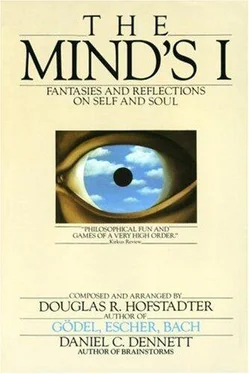The fundamental principle involved is called negative feedback, of which there are various different forms. In general what happens is this. The “purpose machine,” the machine or thing that behaves as if it had a conscious purpose, is equipped with some kind of measuring device which measures the discrepancy between the current state of things and the “desired” state. It is built in such a way that the larger this discrepancy is, the harder the machine works. In this way the machine will automatically tend to reduce the discrepancy—this is why it is called negative feedback—and it may actually come to rest if the “desired” state is reached. The Watt governor consists of a pair of balls which are whirled round by a steam engine. Each ball is on the end of a hinged arm. The faster the balls fly round, the more does centrifugal force push the arms toward a horizontal position, this tendency being resisted by gravity. The arms are connected to the steam valve feeding the engine, in such a way that the steam tends to be shut off when the arms approach the horizontal position. So, if the engine goes too fast, some of its steam will be shut off, and it will tend to slow down. If it slows down too much, more steam will automatically be fed to it by the valve, and it will speed up again. Such purpose machines often oscillate due to overshooting and time-lags, and it is part of the engineer’s art to build in supplementary devices to reduce the oscillations.
The “desired” state of the Watt governor is a particular speed of rotation. Obviously it does not consciously desire it. The “goal” of a machine is simply defined as that state to which it tends to return. Modern purpose machines use extensions of basic principles like negative feedback to achieve much more complex “lifelike” behavior. Guided missiles, for example, appear to search actively for their target, and when they have it in range they seem to pursue it, taking account of its evasive twists and turns, and sometimes even “predicting” or “anticipating” them. The details of how this is done are not worth going into. They involve negative feedback of various kinds, “feed-forward,” and other principles well understood by engineers and now known to be extensively involved in the working of living bodies. Nothing remotely approaching consciousness needs to be postulated, even though a layman, watching its apparently deliberate and purposeful behavior, finds it hard to believe that the missile is not under the direct control of a human pilot.
It is a common misconception that because a machine such as a guided missile was originally designed and built by conscious man, then it must be truly under the immediate control of conscious man. Another variant of this fallacy is “computers do not really play chess, because they can only do what a human operator tells them.” It is important that we understand why this is fallacious, because it affects our understanding of the sense in which genes can be said to “control” behavior. Computer chess is quite a good example for making the point, so I will discuss it briefly.
Computers do not yet play chess as well as human grand masters, but they have reached the standard of a good amateur. More strictly, one should say programs have reached the standard of a good amateur, for a chess-playing program is not fussy which physical computer it uses to act out its skills. Now, what is the role of the human programmer? First, he is definitely not manipulating the computer from moment to moment, like a puppeteer pulling strings. That would be just cheating. He writes the program, puts it in the computer, and then the computer is on its own: there is no further human intervention, except for the opponent typing in his moves. Does the programmer perhaps anticipate all possible chess positions and provide the computer with a long list of good moves, one for each possible contingency? Most certainly not, because the number of possible positions in chess is so great that the world would come to an end before the list had been completed. For the same reason, the computer cannot possibly be programmed to try out “in its head” all possible moves, and all possible follow-ups, until it finds a winning strategy. There are more possible games of chess than there are atoms in the galaxy. So much for the trivial nonsolutions to the problem of programming a computer to play chess. It is in fact an exceedingly difficult problem, and it is hardly surprising that the best programs have still not achieved grand master status.
The programmer’s actual role is rather more like that of a father teaching his son to play chess. He tells the computer the basic moves of the game, not separately for every possible starting position, but in terms of more economically expressed rules. He does not literally say in plain English “bishops move in a diagonal,” but he does say something mathematically equivalent, such as, though more briefly: “New coordinates of bishop are obtained from old coordinates, by adding the same constant, though not necessarily with the same sign, to both old x coordinate and old y coordinate.” Then he might program in some “advice,” written in the same sort of mathematical or logical language, but amounting in human terms to hints such as “don’t leave your king unguarded,” or useful tricks such as “forking” with the knight. The details are intriguing, but they would take us too far afield. The important point is this: When it is actually playing, the computer is on its own and can expect no help from its master. All the programmer can do is to set the computer up beforehand in the best way possible, with a proper balance between lists of specific knowledge and hints about strategies and techniques.
The genes too control the behavior of their survival machines, not directly with their fingers on puppet strings, but indirectly like the computer programmer. All they can do is to set it up beforehand; then the survival machine is on its own, and the genes can only sit passively inside. Why are they so passive? Why don’t they grab the reins and take charge from moment to moment? The answer is that they cannot because of timelag problems. This is best shown by another analogy, taken from science fiction. A for Andromeda by Fred Hoyle and John Elliot is an exciting story, and, like all good science fiction, it has some interesting scientific points lying behind it. Strangely, the book seems to lack explicit mention of the most important of these underlying points. It is left to the reader’s imagination. I hope the authors will not mind if I spell it out here.
There is a civilization two hundred light years away, in the constellation of Andromeda. [14] Not to he confused with the Andromeda galaxy, which is two million light years away. —Eds.
They want to spread their culture to distant worlds. How best to do it? Direct travel is out of the question. The speed of light imposes a theoretical upper limit to the rate at which you can get from one place to another in the universe, and mechanical considerations impose a much lower limit in practice. Besides, there may not be all that mare worlds worth going to, and how do you know which direction to go in? Radio is a better way of communicating with the rest of the universe, since, if you have enough power to broadcast your signals in all directions rather than beam them in one direction, you can reach a very large number of worlds (the number increasing as the square of the distance the signal travels). Radio waves travel at the speed of light, which means the signal takes two hundred years to reach Earth from Andromeda. The trouble with this sort of distance is that you can never hold a conversation. Even if you discount the fact that each successive message from Earth would be transmitted by people separated from each other by twelve generations or so, it would be just plain wasteful to attempt to converse over such distances.
Читать дальше











